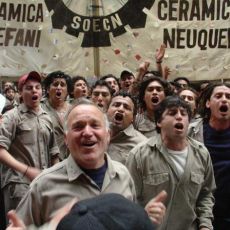Encontro da política com o trabalho: um estudo psicossocial sobre autogestão a partir da experiência das cooperadas da Univens
The meeting of politics and work: a psychosocial study on the self-management experience at the Univens cooperative
Este artigo apresenta uma pesquisa de mestrado em Psicologia Social (IP-USP). O objetivo do estudo foi identificar as principais repercussões psicossociais da experiência de autogestão de uma cooperativa de costura de Porto Alegre (RS), a Univens. Buscou-se compreender como a vivência de relações autogestionárias de trabalho afeta as vidas sociais de seus sujeitos, tanto no plano do trabalho quanto no âmbito das relações familiares, comunitárias e citadinas. Estudo de caso, de cunho etnográfico, teve como ferramentas observações e entrevistas semiestruturadas prolongadas, e como apoios teóricos, as obras de Simone Weil e de Hannah Arendt. Entre outros achados, identificou-se que a experiência política vivida por cooperadas no Orçamento Participativo local representou a principal fonte simbólica da cooperativa, tendo inspirado parte de seus princípios, como o caráter igualitário das relações e a gestão democrática e participativa. Concluiu-se que a experiência política propiciou a experiência econômica neste caso. O direito ao trabalho, o pertencimento ao grupo da cooperativa e o enraizamento como sujeitos nos espaços da Vila e do trabalho representaram as principais repercussões destas experiências, chamadas aqui de permanências, na medida em que compuseram um campo estável de referências para essas trabalhadoras, capaz de salvaguardar a manutenção da vida familiar e o poder de intervenção de suas ações políticas cotidianas. Ainda como conclusões, a pesquisa apresentou a empreendipossibilidade de projetar e realizar ações políticas em horizontes mais amplos como uma repercussão de segundo grau destas permanências e, por conseguinte, desta experiência de autogestão, para seus sujeitos.
Palavras-chave: psicologia social, trabalho, política, autogestão, economia solidária.
This article is the result of a research project in Social Psychology (IP-USP). Its goal was to identify the main sociopsychological repercussions of the self-management experience in a sewing cooperative in Porto Alegre (RS) called Univens. It tried to understand how the experience of self-managed work relations affects the social lives of its subjects in the work environment as well as in the family, the neighborhood, and even the city. The investigation is a case-study in which the researcher chose a methodology based on ethnographic observation and the realization of partially structured long interviews and used the works of Simone Weil and Hannah Arendt as theoretical references. The political experience which some of the members of the cooperative made in the local Participatory Budget was the main symbolic wellspring of the cooperative, as it inspired some of its principles, such as its equalitarian work relations and its democratic and participatory management practices. The study came to the conclusion that it was the political experience that led to the economic experience. The right to work, the fact of belonging to the group of the cooperative, and the rootedness as subjects in the spaces of the neighborhood and work represent the main repercussions of these experiences. They are referred to here as permanencies since they made up a stable field of references for these workers capable of safeguarding the maintenance of their family life and the power of intervention of their daily political actions. Finally, the article discusses the possibility of projecting and realizing political actions with a wider horizon as a secondary repercussion of those permanencies and, therefore, of the self-management experience itself for its participants.
Keywords: social psychology, work, politics, selfmanagement, solidarity economy.
